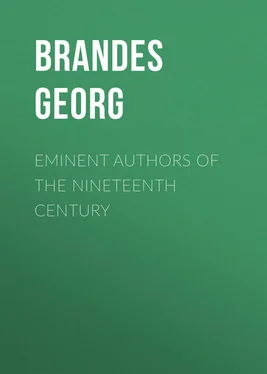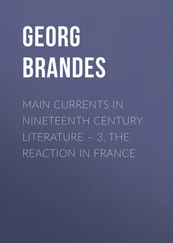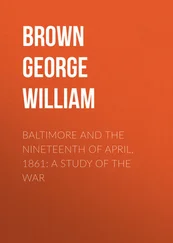Georg Brandes - Eminent Authors of the Nineteenth Century
Здесь есть возможность читать онлайн «Georg Brandes - Eminent Authors of the Nineteenth Century» — ознакомительный отрывок электронной книги совершенно бесплатно, а после прочтения отрывка купить полную версию. В некоторых случаях можно слушать аудио, скачать через торрент в формате fb2 и присутствует краткое содержание. Жанр: foreign_antique, foreign_prose, на английском языке. Описание произведения, (предисловие) а так же отзывы посетителей доступны на портале библиотеки ЛибКат.
- Название:Eminent Authors of the Nineteenth Century
- Автор:
- Жанр:
- Год:неизвестен
- ISBN:нет данных
- Рейтинг книги:5 / 5. Голосов: 1
-
Избранное:Добавить в избранное
- Отзывы:
-
Ваша оценка:
- 100
- 1
- 2
- 3
- 4
- 5
Eminent Authors of the Nineteenth Century: краткое содержание, описание и аннотация
Предлагаем к чтению аннотацию, описание, краткое содержание или предисловие (зависит от того, что написал сам автор книги «Eminent Authors of the Nineteenth Century»). Если вы не нашли необходимую информацию о книге — напишите в комментариях, мы постараемся отыскать её.
Eminent Authors of the Nineteenth Century — читать онлайн ознакомительный отрывок
Ниже представлен текст книги, разбитый по страницам. Система сохранения места последней прочитанной страницы, позволяет с удобством читать онлайн бесплатно книгу «Eminent Authors of the Nineteenth Century», без необходимости каждый раз заново искать на чём Вы остановились. Поставьте закладку, и сможете в любой момент перейти на страницу, на которой закончили чтение.
Интервал:
Закладка:
The most marked trait in Andersen's mode of viewing life, is that which gives the ascendency to the heart, and this trait is genuinely Danish. Full of feeling itself, this method of contemplation takes every opportunity to exalt the beauty and significance of the emotions. It overleaps the will (the whole destiny of the Flax, in the story of its life, comes from without), does combat with the critique of the pure reason as with something pernicious, the work of the Devil, the witch's mirror, replaces pedantic science with the most admirable and witty side-thrusts ("The Bell," "A Leaf From the Sky"), describes the senses as a tempter, or passes them over as unmentionable things, pursues and denounces hardheartedness, glorifies and commends goodness of heart, violently dethrones coarseness and narrowness, exalts innocence and decorum, and thus "puts everything in its right place." The key-note of its earnestness is the ethic-religious feeling coupled with the hatred felt by geniality for narrowness, and its humorous satire is capricious, calm, in thorough harmony with the idyllic spirit of the poet. Its satire has only the sting of a gnat, but it stings in the tenderest places. Which of the modes of contemplation is the best? Such a question is not worthy of an answer. I love the beech, but I love the birch as well. Only because they please me, not in view of casting the balance in favor of either of these modes, I quote the following lines of George Herwegh: —
"My eyes with tears have often been bedewed,
When hearts I've seen all bruised and maltreated,
By hounds of understanding, too, pursued.
"Within the breast one little word is seated,
Yet wisely is its utterance subdued,
For hearts that beat too high will be defeated."
As different as these modes of contemplating life are the poetic endowments of the two authors. La Fontaine writes clear, elegant, highly melodious verse, whose poetry is a light enthusiasm and a gentle melancholy. Andersen writes a grotesque, irregular prose, full of harmless mannerisms, and whose poetry is a luxuriant, gushing, rapturous conceit. It is this fantastic element which makes Andersen so foreign to the French people whose rather gray poetry wholly lacks the bright-hued floral splendor found among the Northern people and attaining its highest beauty in Shakespeare's "Midsummer Night's Dream," a splendor which may be detected throughout Andersen's nursery stories, and which imparts to them their finest perfume. And as the fantastic caprice of this element is Norse-Danish, its idyllic key-note is purely Danish. No wonder that the earliest and most original of these nursery stories were written during the reign of Friedrich VI. and bear the stamp of his day. We recognize this monarch in all the fatherly, patriarchal old kings represented in them; we find the spirit of the age in the complete lack of social, to say nothing of political satire, that we detect in them. No wonder, too, that Thorwaldsen could never weary of hearing these stories read aloud as he counted his numbers in the game of Lotto, for his Danish temperament was naïve, and his art, with all its greatness, was as idyllic as the art which produced these poetic creations.
A genius, born in an age whose every influence opposes his development, is either hopelessly crushed or goes to ruin like any inferior talent. An Andersen born in Denmark in 1705, instead of 1805, would have been a most unfortunate and thoroughly insignificant individual, perhaps even a maniac. A genius born at a period when everything unites to come to its aid, produces classic, genial creations. Now, this first harmony between a poet and his era (in a measure also, his country) corresponds to a second one between the individual faculties of genius, and to a third one between genius and its peculiar type of art. The nature of genius is an organically connected whole; its weakness in one direction is the condition of its strength in another; the development of this faculty causes that one to be checked in its growth, and it is impossible to alter any single particular without disturbing the entire machinery. We may wish that one quality or another was different than it is, but we can readily comprehend that any decided change is out of the question. We may wish our poet had stronger personality, a more manly temperament, and more mental equilibrium; but we have no difficulty in understanding that the lack of defined personality, and the incompleteness of the character whose acquaintance we make in "The Story of my Life," stand in the most intimate relationship with the nature of his endowments. A less receptive mind would not be so susceptible to poetic impressions, a harder one would not unite so much flexibility with its more rigid attitude, one more susceptible to criticism and philosophy would not be so naïve.
Since, then, the moral attributes are requisite to the intellectual, so, too, they are mutually contingent one upon the other. An overflowing lyric sentiment, an exalted sensibility, cannot exist with the experience and method of a man of the world, for experience chills and hardens. A lightly vaulting fancy that hops and soars like a bird, does not admit of being united with the logically measured crescendo and decrescendo of dramatic action. An observation by no means inclined to be cold-blooded cannot possibly penetrate psychologically to the heart of things; a childlike, easily quivering hand cannot dissect a villain. If, therefore, we place genius of this kind face to face with sundry defined and well-known types of art, we can determine beforehand precisely what its relations with each of them will be.
The romance is a species of poetic creation which demands of the mind that would accomplish anything remarkable in it, not only imagination and sentiment, but the keen understanding, and the cool, calm power of observation of the man of the world; that is the reason why it is not altogether suited to Andersen, although it is not wholly remote from his talent. In the entire scenery, the background of nature, the picturesque effect of the costumes, he is successful; but where psychological insight is concerned, traces of his weakness may be detected. He will take part for and against his characters; his men are not manly enough, his women not sufficiently feminine. I know no poet whose mind is more devoid of sexual distinctions, whose talent is less of a nature to betray a defined sex, than Andersen's. Therefore his strength lies in portraying children, in whom the conscious sense of sex is not yet prominent. The whole secret lies in the fact that he is exclusively what he is, – not a man of learning, not a thinker, not a standard-bearer, not a champion, as many of our great writers have been, but simply a poet. A poet is a man who is at the same time a woman. Andersen sees most forcibly in man and in woman that which is elementary, that which is common to humanity, rather than that which is peculiar and interesting. I have not forgotten how well he has described the deep feeling of a mother in "The Story of a Mother," or how tenderly he has told the story of the spiritual life of a woman in "The Little Sea-Maid." I simply recognize the fact that what he has represented is not the complicated spiritual conditions of life and of romance, but the element of life; he rings changes on single, pure tones, which amid the confused harmonies and disharmonies of life, appear neither so pure nor so distinct as in his books. Upon entering into the service of the nursery story all sentiments undergo a process of simplification, purification, and transformation. The character of man is farthest removed from the comprehension of the poet of childhood, and I can only recall a single passage in his stories in which a delicate psychological characteristic of a feminine soul may be encountered, even this appears so innocently that we feel inclined to ask if it did not write itself. It occurs in the story of the new porcelain figures, "The Shepherdess and the Chimney-Sweep."
Читать дальшеИнтервал:
Закладка:
Похожие книги на «Eminent Authors of the Nineteenth Century»
Представляем Вашему вниманию похожие книги на «Eminent Authors of the Nineteenth Century» списком для выбора. Мы отобрали схожую по названию и смыслу литературу в надежде предоставить читателям больше вариантов отыскать новые, интересные, ещё непрочитанные произведения.
Обсуждение, отзывы о книге «Eminent Authors of the Nineteenth Century» и просто собственные мнения читателей. Оставьте ваши комментарии, напишите, что Вы думаете о произведении, его смысле или главных героях. Укажите что конкретно понравилось, а что нет, и почему Вы так считаете.












